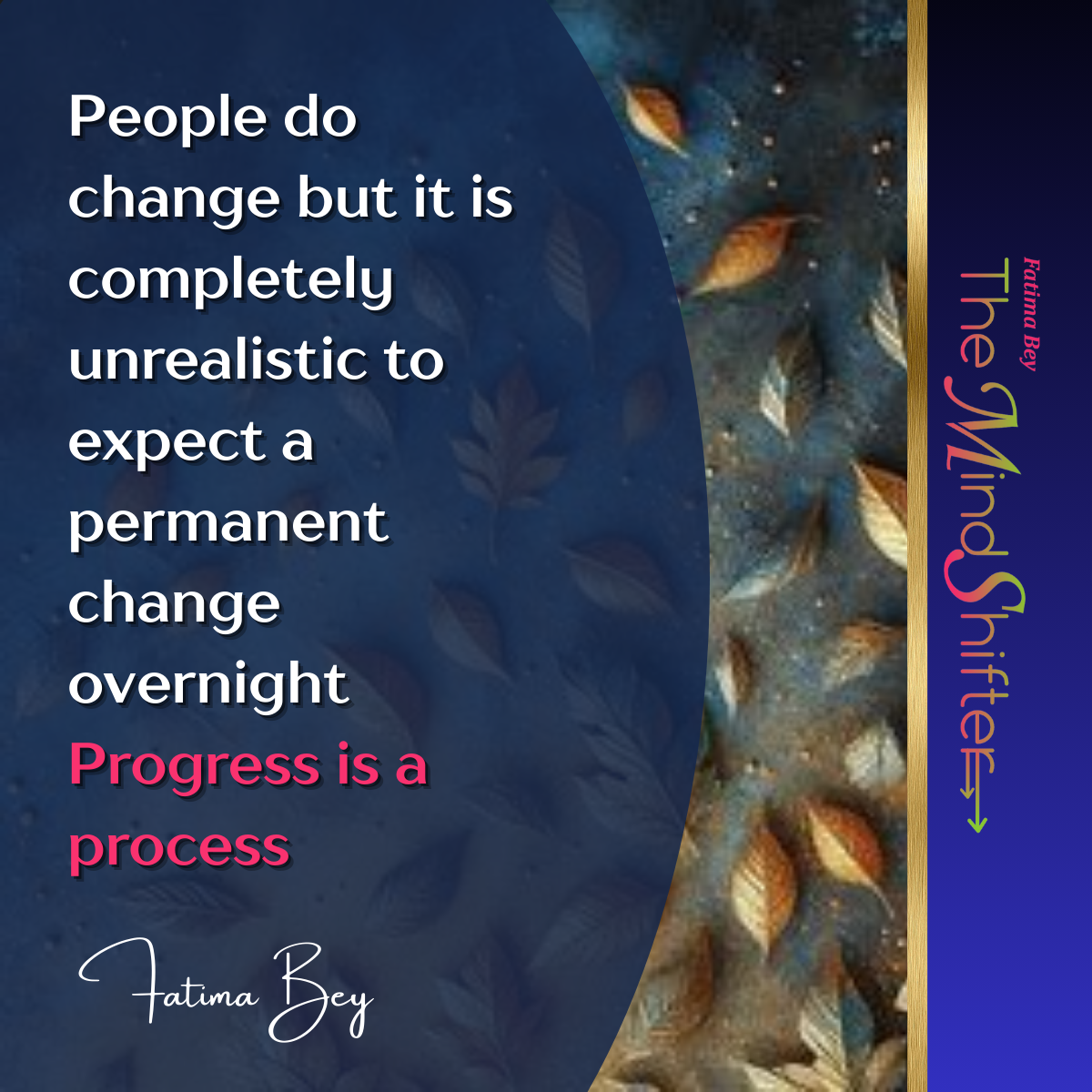Sorry, Your Magical Overnight Transformation Isn't Coming (And Why That's Actually Good News)
If this made you think, it could do the same for someone else. Pass it on.

Your Magical Overnight Transformation Isn't Coming
Life isn't a motivational Instagram post. Change takes time, patience, and a whole lot more grace than most of us are willing to give – including to ourselves. As the quote in this elegant blue graphic reminds us, "People do change but it is completely unrealistic to expect a permanent change overnight. Progress is a process."
Let's talk about why our addiction to instant results is sabotaging our growth and what we can actually do about it.
The Understanding ≠ Implementation Fallacy
Here's something I see constantly: Someone has an "aha!" moment. They finally grasp a concept that's been holding them back. The heavens part, angels sing, and... absolutely nothing changes in their behavior.
Sound familiar?
We've all been there – as the person who understands but can't seem to implement, or as the frustrated observer wondering why they "just don't get it." The truth? Understanding is merely step one of about seven hundred and forty nine on the path to lasting change.
When we explain a concept to someone – whether it's a team member missing deadlines or a friend stuck in toxic relationship patterns – it's easy to catch ourselves thinking, "There! Now they understand! Problem solved!"
But that's complete nonsense, isn't it?
The Neurological Reality Check
Our brains are miraculous but stubborn. Neural pathways carved over years (or decades) don't reroute themselves after one enlightening conversation or workshop.
That team member who finally understands why their communication style fails? They'll still default to old patterns under stress.
That friend who realizes their partner is manipulative? They'll still feel the emotional pull of familiar dynamics.
That client who sees how their pricing strategy is flawed? They'll still panic when implementing changes.
And yes, that person staring back at you in the mirror who knows they should establish boundaries? They'll still say "yes" when they mean "absolutely not."
The Professional Dilemma: Patience vs. Performance
In business environments, this creates a genuine tension. While I believe in giving people room to grow, I also recognize that some roles simply don't have the luxury of a lengthy adjustment period.
If you've hired a senior developer who can't actually code, no amount of "processing time" will transform them into the expert you need right now. If your CFO doesn't understand basic financial principles, your company can't afford the learning curve.
This doesn't mean writing people off as human trash. It means having the courage and compassion to reassess fit. Sometimes the kindest thing is helping someone find the role where they can succeed, not watching them drown while "processing."
The Invisible Journey: Your Growth Timeline vs. Theirs
Another critical point: Just because YOU see something doesn't mean THEY do.
I knew someone who spent years frustrated by a colleague who couldn't grasp what seemed blindingly obvious. What my friend failed to consider was that they had a ten-year head start on this particular learning curve. His "obvious" was the other person's "advanced calculus."
Your insight is the product of your unique journey. Expecting others to arrive at your destination without walking your path is not just unrealistic – it's unfair.
The Readiness Factor: You Can't Force the Bloom
In gardening, you can provide perfect soil, ideal sunlight, and precise watering, but you cannot force a seed to sprout before its time. Growth follows its own timeline.
The same applies to human development. You can create optimal conditions, but you cannot force readiness.
This applies equally to these scenarios:
- The employee who "should" be ready for management
- The partner who "should" be ready for commitment
- The child who "should" be ready for independence
- The part of yourself that "should" be ready to let go
How to Tell If Your Expectations Are Actually Realistic
Here are five questions to assess whether you're setting realistic expectations for change:
- Would you apply this timeline to yourself? If someone expected you to permanently change a lifelong habit in two weeks, would you consider that reasonable?
- Are you confusing comprehension with integration? Understanding a concept intellectually is wildly different from embodying it emotionally and behaviorally. Remember that.
- Are you accounting for stress regression? Under pressure, people revert to established patterns. Does your expectation factor this in?
- Have you established clear, incremental progress markers? Vague expectations like "communicate better" are impossible to measure or achieve.
- Are you providing the necessary support structure? Sustainable change requires environmental reinforcement, not just individual willpower.
The Final, Uncomfortable Truth
Here's the jarring reality we all need to face: The people in your life who frustrate you with their inability to change quickly enough might be mirroring your own resistance to transformation. Your impatience with others reveals precisely where you lack self-compassion for your own growth journey.
The expectations you place on others might be the same ones suffocating your potential.
So perhaps the most important question isn't when they'll change, but whether you're brave enough to create spaces – in business, relationships, and within yourself – where growth is nurtured rather than forced, measured in authentic progress rather than perfect performance, and valued for its depth rather than its speed.
Because the brutal truth is this: The most profound evolutions of character happen in the shadows of everyday decisions – not in dramatic declarations or public transformations. They unfold in the quiet moments when you choose differently despite every instinct screaming for familiarity. In the unglamorous spaces between who you were and who you're becoming, where no audience validates the struggle.
Are you brave enough to embrace the uncomfortable silence of real change?
Fatima Bey The MindShifter
International Speaker, Coach & Creator of the MindShift Universe









